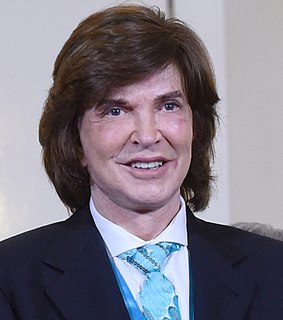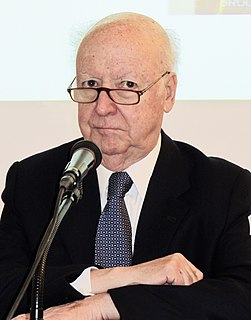
German Casas (born May 27, 1939) is a Chilean singer.

German Casas (born May 27, 1939) is a Chilean singer.
German Casas became famous during the 1960s and 1970s. Many of his songs hit Chilean airwaves and television, making him a household name all over his native country. He was one of Chile's best known rock and roll and twist musicians of the era. [1] In 1967 Casas was named as one of the top five Chilean singers at the national popular music awards. [2]
Some of his most famous songs are "Camina Derechito" ("Walk Straight"), "Rock del Mundial" ("Rock the World Cup"), and "Twist del Estudiante" ("Student's Twist"). [3]
Despite not having any major hits in decades, German Casas has continued touring around Chile, and to other South American countries. Many Chilean fans see him as a legend whose status is as big as that of Julio Iglesias, Elton John or Luis Miguel, for example.
In 2004, Casas was honored at a nationally televised event, for his forty years of work in Chilean show business.
Nueva canción is a left-wing social movement and musical genre in Latin America and the Iberian peninsula, characterized by folk-inspired styles and socially committed lyrics. Nueva canción is widely recognized to have played a profound role in the pro-democracy social upheavals in Portugal, Spain and Latin America during the 1970s and 1980s, and was popular amongst socialist organizations in the region.

Víctor Lidio Jara Martínez was a Chilean teacher, theater director, poet, singer-songwriter and socialist political activist tortured and killed by the dictatorship of Augusto Pinochet. He developed Chilean theater by directing a broad array of works, ranging from locally produced plays to world classics, as well as the experimental work of playwrights such as Ann Jellicoe. He also played a pivotal role among neo-folkloric musicians who established the Nueva Canción Chilena movement. This led to an uprising of new sounds in popular music during the administration of President Salvador Allende.

Camilo Blanes Cortés, known professionally as Camilo Sesto "El Rey del Amor", was a Spanish singer, songwriter and music producer. The singer claimed to have sold more than 175 million records. There are various sales figures for him, ranging from 70 to 200 million records sold. However, his actual sales would represent more than 2.8 million copies worldwide, including nearly 900,000 certified.

The music of Argentina includes a variety of traditional, classical and popular genres. One of the country's most significant cultural contributions is the tango, which originated in Buenos Aires and its surroundings during the end of the 19th century and underwent profound changes throughout the 20th century. Folk music was particularly popular during the 20th century, experiencing a "boom" in popularity during the 1950s and 1960s thanks to artists such as Atahualpa Yupanqui and Mercedes Sosa, prominent figures of the Nuevo cancionero movement. In the mid-to-late 1960s, the countercultural scene of Buenos Aires originated Argentine rock, considered the earliest incarnation of Spanish-language rock for having an autochthonous identity that differed from that of England or the United States. It was widely embraced by the youth and since then has become part of the country's musical identity as much as traditional music. According to the Harvard Dictionary of Music, Argentina also "has one of the richest art music traditions and perhaps the most active contemporary musical life.
Chilean music refers to all kinds of music developed in Chile, or by Chileans in other countries, from the arrival of the Spanish conquistadors to the modern day. It also includes the native pre-Columbian music from what is today Chilean territory.

Luis Miguel Gallego Basteri is a Mexican singer of Spanish and Italian descent, often referred to as El Sol de México, which is the nickname his mother gave him as a child—"mi sol". Luis Miguel has sung in multiple genres and styles, including pop songs, ballads, boleros, tangos, jazz, big band, and mariachi. Miguel is also recognized as the only Latin singer of his generation to not cross over to the Anglo market during the "Latin Explosion" in the 1990s.

Gustavo Adrián Cerati was an Argentine singer-songwriter, composer and producer, considered one of the most important and influential figures of Ibero-American rock. Cerati along with his band Soda Stereo, were one of the most popular and influential rock and pop groups of the 1980s and '90s.

Silvio Rodríguez Domínguez is a Cuban musician, and leader of the Nueva Trova movement.

Edgar Ricardo Arjona Morales, known as Ricardo Arjona, is a Guatemalan singer-songwriter. Arjona is one of the most successful and best-selling Latin American artists of all time, with more than 80 million records sold. He is often called El Animal Nocturno, thanks to his breakthrough success with his fourth studio album, which bears the same name. His music ranges from ballads to Latin pop, rock, pop rock, Cuban music, and more recently a cappella performances and a mixture of Tejano music and Norteño music, and other Afro-American and Latin sounds. Arjona is noted for his lyrical style, and often addresses topics such as love, sexuality, violence, racism and immigration.
Chilean rock is rock music and its corresponding subgenres produced in Chile or by Chileans. Chilean rock lyrics are usually sung in Spanish so can be considered as part of rock en español, although sometimes are sung in English as well.

Norberto Aníbal Napolitano, popularly known as Pappo, was an Argentine rock musician, guitarist, singer and songwriter. He was and is one of the most influential figures in Argentine music, and in addition to being one of the forerunners of Argentine rock. Besides, he was one of the first to venture into heavy metal in his country and blues of the same.

María de los Ángeles Felisa Santamaría Espinosa, professionally known as Massiel, is a Spanish pop singer. She won the Eurovision Song Contest 1968 with the song "La, la, la", beating the British pop singer Cliff Richard's "Congratulations".

María Natalia Lafourcade Silva is a Mexican pop-rock and folk singer and songwriter who, since her debut in 2002, has been one of the most successful singers in Latin America. Lafourcade's voice has been categorized as a lyric soprano.

Gilberto Santa Rosa, nicknamed "El Caballero de la Salsa", is a Puerto Rican bandleader and singer of salsa and bolero. He is a six time Grammy Award winner and has sold over three million records in the United States and Puerto Rico. Santa Rosa also starred in a comedy.

Jorge Edwards Valdés is a Chilean novelist, journalist and diplomat. He was the Chilean ambassador to France during the first Piñera presidency.

Raúl Alberto Antonio Gieco, better known as León Gieco is an Argentine folk rock performer, composer and interpreter. He is known for mixing popular folkloric genres with Argentinian rock and roll, and lyrics with social and political connotations. This has led to him being called "The Argentine Bob Dylan".

Iván Patricio Eugenio Manns de Folliot was a Chilean singer, composer, author, poet, novelist, essayist, play writer and journalist.

Miguel Rafael Martos Sánchez, often simply referred to as Raphael, is a Spanish singer and television, film and theater actor. Raphael is recognized as one of the most successful Spanish singers in the world, having sold more than 70 million records worldwide in 7 languages.
The nueva ola was a loosely affiliated group of musicians, mainly in Spanish-speaking South America, who played and introduced rock 'n roll and other American and European music of the 1950s and 1960s to their countries. The term "nueva ola" was coined in Argentina around the turn of the 1960s to denote the foreign rock and roll styles that were gaining popularity among the youth, along with their local exponents. From there, the concept spread to Chile, with exponents such as Buddy Richard, Los Carr Twins, Los Red Junior, Luis Dimas, José Alfredo Fuentes, Fresia Soto, Cecilia, Gloria Aguirre and Pat Henry. And in Peru, with exponents such as Kela Gates, Jimmy Santi, Los Doltons, Joe Danova, Los Silvertons, Los Belkings and Anita Martinez.
Sonora Palacios is one of Chile's oldest tropical orchestras. Formed in the early 1960s, the group is one of the main exponents of Chilean cumbia and were pioneers of the style. They were the first Chilean band to record cumbia and are widely recognized for establishing the popularity of cumbia in Chile.